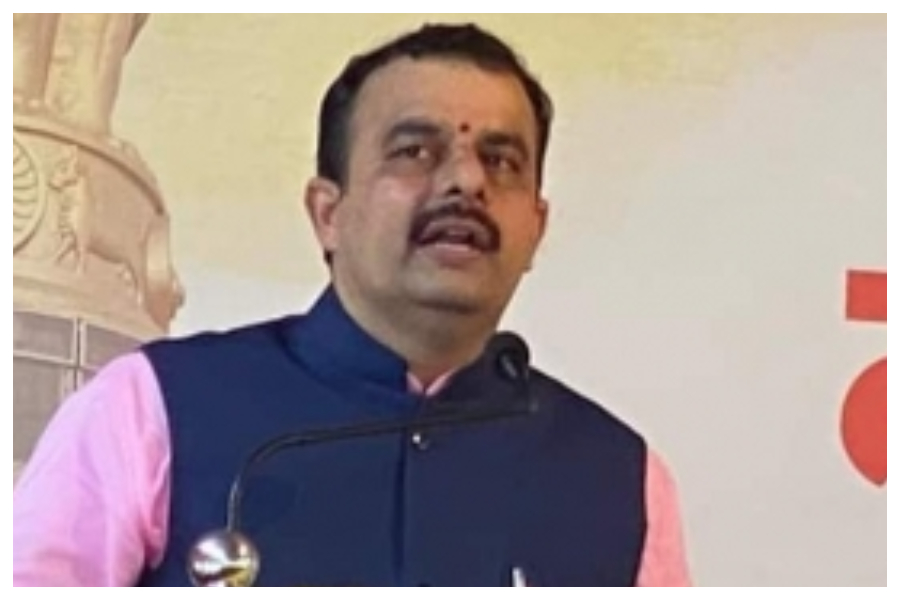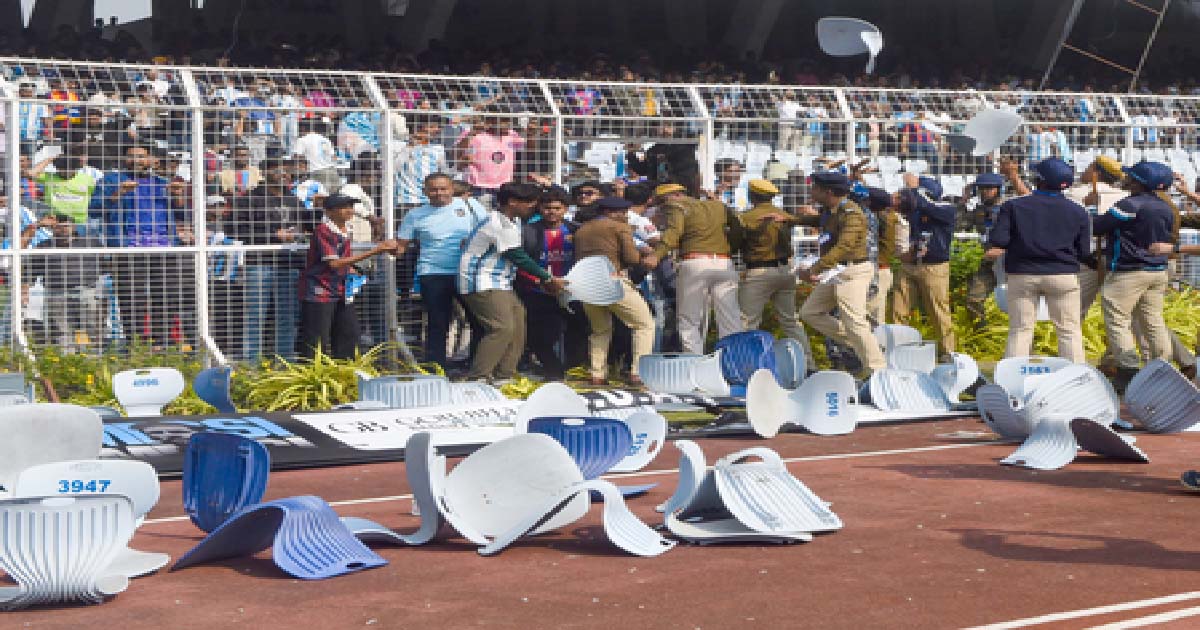National News
‘We should respect court order, Cong will make hijab compulsory for Hindus’: K’taka BJP Minister

While all attention is on the Karnataka High Court’s verdict expected Wednesday on wearing hijab, Karnataka BJP Minister for Power, Kannada and Culture V. Sunil Kumar said, “we should respect the order of the High Court on hijab row.”
Speaking to reporters, Minister Sunil Kumar attacked the Congress, saying “if it comes to power, the leaders of Congress will make wearing of hijab compulsory for Hindus. The Congress should come out of communal mindset.
“Congress party has always been sided with divisive forces from 1947. During partition also Congress was with forces who wanted to divide the country. In the present situation also the party is supporting the divisive agenda,” he said.
Sunil Kumar turning his guns on Opposition leader Siddaramaiah said that he started celebrating Tipu Jayanti which led to the killing of Hindu leaders. “Siddaramaiah says he is against wearing of tilak, he is opposing the Anti-Conversion Bill,” he said.
Araga Jnanedra, the state Home Minister said that those arrested for the violence are outsiders and not students. Action will be initiated on the untoward incidents happening in the state. He also criticized state Congress President D.K. Shivakumar for alleging that Tricolour was removed for hoisting ‘Bhagwa Dhwaj’ in Shivamogga College.
Meanwhile, Nassir Hussain, the Congress Rajya Sabha member from Karnataka addressing mediapersons in New Delhi said that the internal politics within the BJP Karnataka unit is resulting in the hijab crisis. “A group of leaders within the BJP do not want Basavaraj Bommai to become the Chief Minister. Now, they are at play. Due to internal politics of BJP, the state is suffering,” he stated.
Basavaraja Rayareddy, senior Congress leader and former minister demanded implementation of the President’s Rule in the state as the state government failed to control law and order situation in the state. “The government is in the clutches of RSS. Chief Minister Basavaraj Bommai has zipped his mouth,” he stated.
Meanwhile, another Congress local leader Ibrahim Khan has kicked up a controversy by stating that if anyone comes against the hijab, they will be cut into pieces. “We will not tolerate it when it comes to the matter of our religion,” he said.
Reacting to BJP MLA Basavanagouda Patil Yatnal’s statement that those ‘who want to wear hijab can go to Pakistan’, he stated that “we are Indians. We were born here and will die here and the country does not belong to Yatnal,” he stated.
Meanwhile, Vachananda Seer has asked the people to maintain peace in the society and accept the ruling of the High Court on hijab row and follow it without giving room for any untoward incidents.
Hijab row started last month with a few students of Udupi Government Pre-University College wearing hijab were denied permission to attend classes. The college authorities maintained that the students who used to come without hijabs have suddenly started wearing hijabs. The students later went on protest refusing to attend classes without hijab. The issue became a controversy and spread to other districts snowballing into a major crisis in the state.
National News
J&K to receive Rs 5.5 billion investment in tourism sector: Omar Abdullah

Srinagar, Dec 13 (IANS) Chief Minister Omar Abdullah said on Saturday that J&K is set to receive Rs 5.5 billion investment in the tourism sector under an externally funded project.
Omar Abdullah hoped that the investment and collective effort would help J&K establish itself again as India’s leading adventure tourism destination.
Earlier in the day, the Chief Minister inaugurated Asia’s longest ski drag lift at Kongdori, Gulmarg. This landmark addition will significantly enhance skiing infrastructure and further strengthen Gulmarg’s standing on the international winter sports map.
The Chief Minister also inaugurated the rotating conference hall at Affarwat, Gulmarg. He was accompanied by Advisor Nasir Sogandi, MLA Gulmarg Farooq Shah and MLA Zadibal Tanvir Sadiq.
Later Addressing a gathering of adventure tour operations, who are here to attend 17th annual convention of the Adventure Tour Operators Association of India (ATOAI) being held from December 17th to December 20th, the Chief Minister said Jammu and Kashmir has immense natural potential and, if properly blended with professional experience and coordinated work, there would be no difficulty in restoring its past position in adventure tourism.
Omar said he had made the point earlier as well that the success of tourism should not be measured by bringing tourists to Kashmir once, but real success would be achieved only when tourists feel motivated to return repeatedly, year after year.
He said the approach of the government and the tourism sector should always be centred on long-term engagement with visitors.
“Our attempt should be that tourists say they will not go anywhere else and will come only to Kashmir to celebrate their vacations. Such a goal could be achieved only if all stakeholders worked together,” he said.
The Chief Minister added that the tourism department and all related agencies must act in coordination to strengthen the sector and improve the overall tourist experience.
“It has been extremely difficult for Jammu and Kashmir, with setbacks and troubling incidents emerging from different places almost every month. At times, it felt as if the region was being repeatedly hit from one side or another,” he added.
Omar said that even the hope of some relief during winter did not fully materialize as the season remained largely dry, which further impacted tourism and those dependent on it for their livelihoods. He asked people to pray for snowfall, but not in such a measure that it becomes unbearable.
National News
Mamata Banerjee announces judicial committee to probe chaos at Salt Lake Stadium over Lionel Messi’s visit

Kolkata, Dec 13: With chaos and vandalism breaking out at Salt Lake Stadium on the northern outskirts of Kolkata on Saturday over high ticket prices and limited access to Argentinian soccer star Lionel Messi during his visit to the stadium, West Bengal Chief Minister Mamata Banerjee announced setting up a judicial committee headed by a retired judge of the Calcutta High Court to probe the mismanagement that led to the chaos.
With the agitators resorting to a rampage within the stadium over limited access to Messi despite purchasing tickets at exorbitant prices, the police had to resort to a massive lathi charge and deploy Rapid Action Force (RAF), following which the Argentinian soccer star left the stadium early.
The Chief Minister was on her way to the stadium. However, on receiving the news of the ruckus at the stadium, she directed her driver to turn back the car. Soon after that, she issued a statement announcing her decision to set up a judicial committee headed by a retired judge of the Calcutta High Court to probe the mismanagement that led to the chaos.
“I am deeply disturbed and shocked by the mismanagement witnessed today at Salt Lake Stadium. I was on my way to the stadium to attend the event along with thousands of sports lovers and fans who had gathered to catch a glimpse of their favourite footballer, Lionel Messi. I sincerely apologise to Lionel Messi, as well as to all sports lovers and his fans, for the unfortunate incident,” the Chief Minister said in her social media statement.
Announcing the decision to form the judicial probe committee, she said that the committee will be headed by Justice (Retd) Ashim Kumar Ray. The state chief secretary, Manoj Pant, and the additional secretary to the state home and hill affairs department, Nandini Chakraborty, will be the two other members of the probe panel.
“The committee will conduct a detailed enquiry into the incident, fix responsibility, and recommend measures to prevent such occurrences in the future. Once again, I extend my heartfelt apologies to all sports lovers, the Chief Minister added.
National News
Lionel Messi GOAT India Tour: Traffic Diversions Announced In Mumbai On December 14 | Know Restrictions For Roads Around Wankhede Stadium

Mumbai: The Mumbai Police has announced traffic diversions as football fans in the city are set for a major attraction, with Argentina skipper and World Cup winner Lionel Messi scheduled to visit Mumbai on December 14. The global football icon will visit Wankhede Stadium, where the event is set to begin at 5 pm. With a large turnout expected, the police have put special traffic arrangements and diversions in place to manage crowd movement and ensure smooth traffic flow in and around the stadium area.
diversions will be effective on 14 December from 12:00 pm to 11:00 pm.
According to the report, commuters heading to Wankhede Stadium should note that no parking will be permitted inside the stadium premises. As per the report, parking restrictions will be there on C, D, E, F and G roads. In addition to this, along with these, there will also be restrictions on Veer Nariman, Dinshaw Vachha, Jamshethji Tata and N.S. Road.
To manage traffic flow, one-way movement will be implemented on D Road (west to east) and E Road (southbound). Entry and movement on Veer Nariman Road will also remain restricted during this period.
Several road closures have also been announced, including the Coastal Road stretch between Marine Drive and Worli/Tardeo, and Chandra Bose Road, according to the report.
For those arriving by car, parking facilities will be available on a limited basis near Churchgate, HT Parekh Marg, Dorabaji Tata Road, Jamanalal Bajaj Marg and Vidhan Bhavan.
Messi’s Mumbai visit will begin with his participation in a high-profile charitable fashion showcase, where memorabilia from Argentina’s historic 2022 World Cup win will be auctioned. The proceeds from the auction will be donated to charitable causes, adding a meaningful layer to the event.
As per media reports, Bollywood heavyweights such as John Abraham, Kareena Kapoor Khan, and Jackie Shroff are expected to join the showcase.
Sport will take centre stage again at the Cricket Club of India, which will host a special Padel Cup. The friendly yet competitive match is set to feature cricket icons, including Sachin Tendulkar, alongside celebrity guests. A separate 7v7 celebrity football match with Bollywood actors is also reportedly in the works, promising crowd-pleasing entertainment.
At Wankhede Stadium, fans will witness Messi in his element. The football icon will conduct an exclusive coaching clinic for 60 children, 30 boys and 30 girls, selected from emerging football talent pools. The stadium event also includes interactive penalty shootouts and a masterclass led by Messi himself, followed by a musical concert celebrating his legacy.
-

 Crime3 years ago
Crime3 years agoClass 10 student jumps to death in Jaipur
-

 Maharashtra1 year ago
Maharashtra1 year agoMumbai Local Train Update: Central Railway’s New Timetable Comes Into Effect; Check Full List Of Revised Timings & Stations
-

 Maharashtra1 year ago
Maharashtra1 year agoMumbai To Go Toll-Free Tonight! Maharashtra Govt Announces Complete Toll Waiver For Light Motor Vehicles At All 5 Entry Points Of City
-

 Maharashtra1 year ago
Maharashtra1 year agoFalse photo of Imtiaz Jaleel’s rally, exposing the fooling conspiracy
-

 National News1 year ago
National News1 year agoMinistry of Railways rolls out Special Drive 4.0 with focus on digitisation, cleanliness, inclusiveness and grievance redressal
-

 Maharashtra1 year ago
Maharashtra1 year agoMaharashtra Elections 2024: Mumbai Metro & BEST Services Extended Till Midnight On Voting Day
-

 National News1 year ago
National News1 year agoJ&K: 4 Jawans Killed, 28 Injured After Bus Carrying BSF Personnel For Poll Duty Falls Into Gorge In Budgam; Terrifying Visuals Surface
-

 Crime1 year ago
Crime1 year agoBaba Siddique Murder: Mumbai Police Unable To Get Lawrence Bishnoi Custody Due To Home Ministry Order, Says Report












